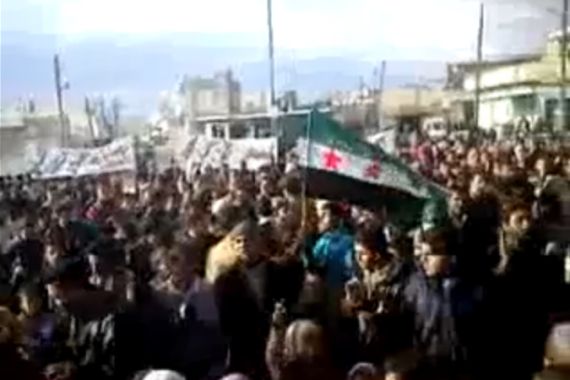Syrian opposition calls for fresh protests
Assad opponents press for foreign military intervention as Kofi Annan prepares to brief UN body on diplomatic efforts.

Syria’s opposition has called for fresh protests to press for foreign military intervention in the country even as Kofi Annan, the UN and Arab League’s special envoy, prepared to brief the Security Council on his efforts to bring both sides to the negotiating table.
Demonstrations are already taking place in the city of Qamishli in the northeast and more are expected throughout the country on Friday. Activists are calling this week’s protest “the Friday for international military intervention”.
Calls for foreign countries to arm the opposition or directly intervene in the conflict have grown stronger in the face of a brutal government crackdown, though the strategy is not popular with the United States or European countries.
Recep Tayyip Erdogan, the Turkish prime minister, said on Friday that his government was considering setting up a “security” or “buffer” zone along the border with Syria. He called on Turkish citizens in Syria to return home and said the Turkish ambassador might be withdrawn from Damascus as soon as they do.
Such a buffer zone, under consideration for months, would allow refugees to leave and humanitarian supplies to enter but could also become a safe haven and supply route for armed opposition fighters.
In recent weeks, the Syrian army has driven rebels out of the cities of Homs and Idlib and in the past two days, troops have assaulted Deraa, the southern birthplace of the year-old revolt, using machine guns and conducting house-to-house raids.
But the armed opposition, which calls itself the “Free Syrian Army,” remains hard to crush, and elements have even established themselves in the Damascus suburbs, where they fought government troops on Thursday night and Friday morning.
UN mission
Annan, a joint UN-Arab League envoy, has said he believes a negotiated political settlement to end the conflict is possible. He visited Syria a week ago and met with Assad and on Friday will brief the Security Council on his efforts.
UN experts will also accompany an upcoming Syrian government-led humanitarian mission, the second time UN personnel have visited protest sites this month, the organisation’s humanitarian chief said.
Valerie Amos said on Thursday that UN technical experts would join the Syrian mission, but she demanded the observers be given free access to to restive cities.
Analysts said the delegation, which will visit Homs, Deraa and Hama, where thousands have been killed, fell short of an earlier offer of a joint assessment mission. It is not scheduled to visit Idlib, in the north, the most recent site of major clashes between the army and armed opposition.
Amos said the mission would start this weekend and also visit Tartous, Latakia, Aleppo, Deir al-Zour and rural areas around Damascus.
She said technical staff from the UN and Organisation of Islamic Cooperation would join the mission “and take the opportunity to gather information on the overall humanitarian situation and observe first-hand the conditions in various towns and cities”.
But Amos stressed that “it is increasingly vital that humanitarian organisations have unhindered access to identify urgent needs and provide emergency care and basic supplies”.
‘Brutal repression’
In a message to mark the first anniversary of the start of protests in Syria, UN Secretary-General Ban Ki-moon said President Bashar al-Assad had “responded with brutal repression, which has continued unabated”. He said “well over” 8,000 people have died.
“It is urgent to break the cycle of violence, stop military operations against civilians and prevent a further militarisation of the conflict in Syria,” Ban said.
He expressed “solidarity” with the Syrian people and called on the Syrian government and opposition to co-operate with Annan.
As the opposition marked the first anniversary of the revolt on Thursday, government troops pressed ahead with their efforts to control key cities in the south and north.
Assad supporters marked the occasion with rallies across the country, including in the capital Damascus, saying the uprising was a “conspiracy” against the state.
Pro-Assad rallies were also held in Suweida to the south and al-Hassake in the northeast.
“After a whole year of pressure on Syria, we want to make the world hear our voice: Leave Syria in peace,” a woman on the street told a government television station.